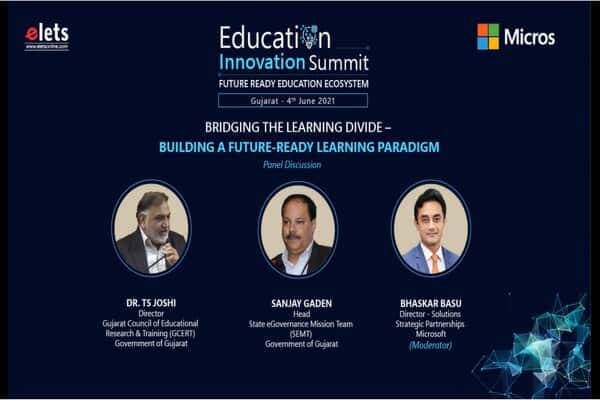
After the COVID pandemic, the perception of education has changed dramatically. From a time when mobile phones were prohibited in schools and students were asked to read more than just Google the facts to a time when each lecture, chapter and assignment are delivered through digital platforms. How the pandemic impacted education in Gujarat how the government took the challenge of continuing education amid the pandemic, were a few of the questions answered in the panel discussion at the Education Innovation Summit 2021. The summit was jointly organised by Microsoft India and Elets Technomedia.
Bhaskar Basu, Director – Solutions Strategic Partnerships, Microsoft India, moderated the panel discussion. Panelists included Sanjay Gaden, Head, State e-Governance Mission Team (SEMT), Government of Gujarat and Dr TS Joshi, Director, Gujarat Council of Educational Research and Training (GCERT), Government of Gujarat.
Sanjay Gaden, sharing his views on the COVID-19 situation said, “Considering the loss of lives and people’s health and well-being, this is a major atrocity. However, on the other side, the pandemic made people think about alternatives and devise solutions unlike the earlier approach of cribbing about the problem.” People were locked down in their homes and technology tools were the only gateway connecting the outside world. This period imbibed a feeling among the population that this crisis may go or may not go but we should do something rather than sitting idle. So, this willingness to do something with so many restrictions and limitations sparked people’s creative thinking.


“Technology is no more an option but the need of the hour and this also holds true for the education sector… Whenever there is a need to reach out to the remotest corner of the country, concerning the education sector, the process should be highly decentralised. By decentralisation, I refer to alternatives that can be adapted to impart education,” he added.

Addressing the challenges due to linguistic differences in imparting education, Sanjay Gaden said, “It takes the same amount of creativity in creating content, however, in a diverse country like India where different states have different languages, content needs to be prepared with linguistics differences in mind. Also, one cannot be the master of every language. Therefore, technology plays an important role here. We should leverage technology to translate the same content in different languages to increase the penetration of education to the remotest corners of the country.” Further, radio can be leveraged as an effective medium to disseminate educational content as it requires the least infrastructural support, no smartphones, no screens, and has its reach in every nook and corner of the country, he added.
Also Read: Gujarat & Microsoft join hands to ensure education continuity amid lockdowns
Backing the viewpoints of Sanjay Gaden, Bhaskar said, “The one silver lining in the COVID-19 scenario is that it accelerated the adoption of technology. The pandemic has kind of necessitated the use of tools like Microsoft Teams, Microsoft 365, etc.”
Dr TS Joshi commenced with a comment on Bhaskar’s remark “… challenges due to COVID-19…” he said, “More than challenges, I think these were opportunities. This pandemic has been such a situation that has reshaped a lot in the present and this will impact the near future. A new normal has been set in since the pandemic. People should also look at the positives of the pandemic, a teacher who is about to retire in a year or two, was not tech-savvy, is taking online classes today. This is an accomplishment.” Today, even in remote villages students are leveraging smartphones to take online lectures. “I am pretty sure that the NEP 2020’s goal of creating 21st-century global citizenship and preparation of smart citizens is no more far-fetched,” he added.

“Education mainly aims at self-learning and the pandemic has allowed students to venture in such ways and means,” said Dr Joshi. For teachers, before the pandemic, only physical classroom teaching was the only way. However, in the present scenario, digital mediums have become an added advantage. There is no doubt that even after the pandemic is over the teachers or the institutions will be taking up education in a hybrid model with partly online and partly offline, added Dr Joshi.
“It is to be noted that the Government of Gujarat has been distributing physical books and learning modules at students’ doorsteps to ensure the continuity of education. Also, TV channels like Doordarshan and other government and private channels started delivering academic content to students. Today, we have a channel for each class,” said Dr Joshi. In his concluding note, he thanked Microsoft for their virtual meeting tool Microsoft Teams saying “Lately, we organised a science fair on the Microsoft Teams platform. This platform enabled hundreds of students to join the fair. I would like to thank Microsoft for this.”
Be a part of Elets Collaborative Initiatives. Join Us for Upcoming Events and explore business opportunities. Like us on Facebook , connect with us on LinkedIn and follow us on Twitter, Instagram.











